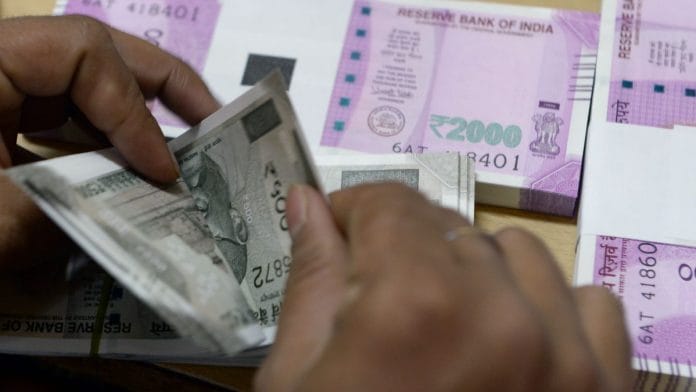New Delhi: The Modi government is unlikely to meet its fiscal deficit target of 3.4 per cent for the fiscal 2018-19 as direct tax collections fell short by about Rs 75,000 crore, or 6.25 per cent, even as the disinvestment target was successfully achieved.
“Fiscal deficit target was a challenge. Direct tax collections have fallen short but disinvestment receipts have been good. It will be a close call,” a senior finance ministry official told ThePrint on condition of anonymity.
While the government’s accrual from disinvestment stands at Rs 85,000 crore — over Rs 5,000 crore more than the target — for 2018-19, the final direct tax collections are estimated at around Rs 11.25 lakh crore as against a target of Rs 12 lakh crore, said the finance ministry official.
The target was increased from Rs 11.5 lakh crore to Rs 12 lakh crore on 1 February when railways and coal minister Piyush Goyal presented the interim budget in the absence of finance minister Arun Jaitley.
Goyal also reset the fiscal deficit target for the fiscal to 3.4 per cent from the earlier 3.3 per cent.
However, finance secretary Subhash Chandra Garg Thursday said the government was “close to meeting fiscal deficit target of 3.4 per cent”, adding that the picture will be clear in the next few days.
“Some numbers are still to come. So, we will wait for a couple of days. There will always be some shortfall…,” Garg said on the sidelines of a session at a Confederation of Indian Industry (CII) event.
The fiscal deficit target for 2019-20 has also been set at 3.4 per cent.
Also read: CBDT raises alarm as direct tax collection falls 15% short of target
‘Pressure’
Earlier, global ratings agency Moody’s called India’s fiscal deficit target a “credit negative”. It noted that while the budget did not envisage new policies to increase revenues, a number of expenditure measures were announced which will increase outlays and put pressure on the government’s ability to meet its target.
In 2014-15, India’s fiscal deficit stood at 4.1 per cent, while in 2015-16, it narrowed to 3.9 per cent. The figure for both 2016-17 and 2017-18 remained at 3.5 per cent.
Speaking at the annual CII session Thursday, finance minister Arun Jaitley said the NDA government will stick to the path of fiscal prudence if voted back to power in the Lok Sabha elections.
However, CII chief economist Bidisha Ganguly said, “There will be pressure on the fisc with tax collections falling short. We have to see how this is met.”
Nirupama Soundararajan, senior fellow and head of research at non-profit think-tank Pahle India Foundation, echoed the sentiment.
“There will be an impact and it will not be easy for the government. But now with the RBI (Reserve Bank of India) lowering interest rates, investments are set to pick up in the coming months and this will boost growth. Once that happens, the situation will improve,” Soundararajan said.
Also read: Income Tax refunds being held back so that stiff collection targets are met, allege CAs







How much of this 85,000 crores by way of disinvestment has come from Indian households subscribing to issues by PSUs …